There seems to be much confusion around the subject of which essential oils you can drink. The essential oil market is big with many companies and producers vying for attention by making unsubstantiated and often exaggerated claims about its benefits. If you are stepping into the new and promising world of essential oils, you would be well-advised to arm yourself with at least some basic knowledge, before buying essential oils you can drink. Used correctly, these potent plant extracts may be very beneficial, but you have to know how to use them. In this short article, we cover some of the essential oils you can drink and how to take them.
What are essential oils
They are highly concentrated parts of certain plants, extracted from leaves, rinds, petals, barks, and herbs. One drop may contain the equivalent parts of various plants. Extracted oils are often added to personal care items such as creams, shower gels, vegetable oils, or processed food products for flavor. More research is needed, but several studies already show promise. These essential oils you can drink, apply topically, or inhale, dependent on their correct use of course.
Ways to use essential oils
Generally considered as an alternative or complementary treatment, essential oils still fall outside the mainstream health system. Most commonly used in aromatherapy, essential oils may relieve skin conditions, aid in digestion, relieve stress, insomnia, muscle pain, headaches, and depression. Smelling these oils, help stimulate receptors in the brain which in turn sets off a series of reactions in the body that increase physical and mental well-being. You can take them in 3 ways, namely topically, through inhalation, or as essential oils, you can drink. Adding them to your diet requires the utmost care in order to avoid possible side effects because pure, unadulterated oils are potent. Remember also that not all oils can be ingested and that the purity of different brands may vary. Even when the bottle states its safety for internal use, those taking medication, pregnant women, and children are advised to stay away. Everyone else that wants to use essential oils internally should work with a licensed aromatherapist or physician.
How to use essential oils you can drink
Ok, first off it is super important to dilute them. Essential oils you can drink are generally way too strong to use straight as they can injure the esophageal tract, cause stomach irritation, ulceration of the mouth and wear away teeth enamel. Using essential oils internally should not be a daily habit as such, but used rather aid with certain health issues. Ingesting essential oils for the long term is not advised as it can cause liver damage. Always use the purest, most unadulterated, and clean brand you can find. Many brands’ essential oils are not as unadulterated as they claim to be. So it is best to speak with a licensed practitioner knowledgeable in essential oil use for use internally. Here are 5 ways to use essential oils you can drink:
Dilute essential oils in vegetable oil
The best way to ingest essential oils, therefore, is to dilute them with vegetable oil, such as pure high-grade olive oil or coconut oil. Exactly how much depends, but in order to avoid any negative reactions, consider that less is more. One single drop mixed with vegetable oil is usually considered safe for most people. Add some raw honey for taste if you like.
Put 1 or 2 drops of essential oil in a vegetable capsule.
This method may help protect the esophageal tract.
Under the tongue
There are oils such as lemon, frankincense, and orange essential oil that are considered gentle enough to be taken this way. Taking oils under the tongue provides for fast access into the bloodstream. Use this method only for a few days. As a long-term strategy, it is not advised. Stop immediately if you experience any irritation or reaction.
Cooking with essential oils
- Add 1 or 2 drops of lime essential oil to your favorite homemade guacamole.
- Add 1 to 2 drops of black pepper essential oil to any meaty dishes
- Add 1 drop of cumin essential oil to vegetable or chicken curries
Create a tasty flavorful drink
Add 1 to 2 drops of lemon or lime essential oil to 1 liter of sparkling water. Add a sweetener of choice like liquid stevia, a few peppermint leaves, and voila you have your own homemade lemonade.
Know your essential oils you can drink
Certain essential oils should never be taken orally. It is also important to remember that your body absorbs more in this way, increasing the risk of interference with medications or causing toxic reactions. Taking essential oils you can drink on a continued on a daily basis is not advised as it may cause diverse effects such as headaches and fatigue. Here are just a few examples of essential oils considered safe and not safe for most:
Oregano and clove essential oils should always be diluted with a carrier oil.
Large amounts of tea tree, wintergreen, and camphor can cause adverse reactions such as throat swelling, nausea, heart palpitations, and seizures.
Eucalyptus and peppermint essential oils contain Phenols that may irritate the respiratory tract, especially babies.
Lavender and tea tree essential oils contain estrogen-like substances which disrupt the testosterone levels in young boys if they take too much of it.
Ingesting pennyroyal essential oils may lead to miscarriage.
For a comprehensive list compiled by the FDA of Generally Considered As Safe (GRAS) you can go here.
Some last thoughts on essential oils you can drink
Study up on different essential oils, their uses and benefits, and risks. It is no use buying an essential oil that smells nice and expecting it to be safe. If you are going to use essential oils you can drink it is important to seek advice from an expert in the field. Read the labels properly. Low quality or adulterated essential oils may have labels that state ‘for external use only’ or ‘not for internal use’. In which case, you should avoid them for internal use. It is always wise to approach a licensed practitioner who has extensive knowledge of essential oils you can drink and who will be able to recommend safe brands and help you make decisions based on your specific health condition.
If you enjoyed this article, you might like these too:
Are expensive essential oils worth it?
Top 4 essential oils that moisturize dry skin the best.
Which essential oil contains vitamin C?
These 6 secret essential oils help treat hyperpigmentation.
What are the signs of essential oil toxicity in dogs?
Cautionary and disclaimer: The contents of this website are for informational and entertainment purposes only and do not constitute medical advice; the content is not intended to be a substitute for professional medical advice, diagnosis, or treatment. The contents of this article were not evaluated by any health practitioner whatsoever. Always seek the advice of your licensed aromatherapist, dermatologist, a physician with any questions you may have regarding the safe use of essential oils.
Affiliate Disclosure: Some of the links that appear on this site are affiliate links. We may receive a small commission when you make a purchase. These commissions help to improve this site and to fund further research. The buyer does not pay any commission whatsoever but is an arrangement between the supplier and this site. Our selection of products is carefully curated and includes only those products we believe in.




